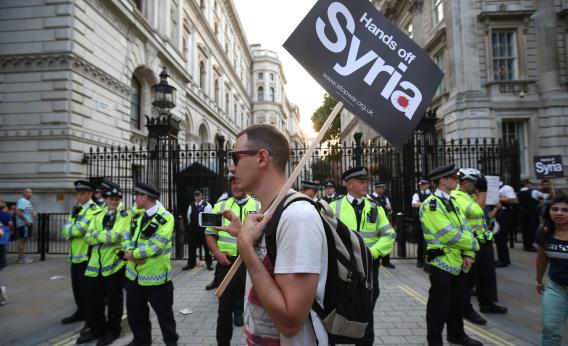BuzzFeed’s Rosie Gray has an article looking into why, despite widespread public opposition to military intervention in Syria, we haven’t been hearing much from anti-war groups that were a major political presence during the Bush administration. The article concludes, based on interviews with leaders of groups like Code Pink and Peace Action, that Iraq-era anti-war groups are struggling with funding and membership and that enthusiasm for the cause has dissipated among lefty types with Barack Obama in office.
To a certain extent, this makes sense. There’s abundant evidence to suggest that people’s views on which national practices are acceptable vary significantly depending on whether a president they like is in office. But it’s also an apples-to-oranges comparison.
First, there’s the issue of timing. At the time of the largest Iraq protests, war talk had been growing steadily for months and the actual invasion wouldn’t happen for another few weeks. In this case airstrikes didn’t seem likely until last Friday and will probably come in the next few days. That’s not much time to mobilize anyone beyond Code Pink’s existing membership.
Second, a major premise of the anti-Iraq movement was that the Bush administration was hyping the intelligence on weapons of mass destruction. Yes, Saddam Hussein had also used chemical weapons (with the U.S. government’s knowledge), but that was years earlier. In this case the attack happened last week and the photos of its aftermath are still being plastered on the news. You can argue that Assad’s use of chemical weapons is a bad reason to attack, but it’s harder to argue that the Obama administration is simply inventing a reason to invade a country it has been wanting to invade for years.
Then there’s the issue of casualties. There’s no discussion at the moment of ground troops in Syria, and so the likelihood of U.S. troops dying is less. Anti-war groups do obviously care about Iraqi or Syrian civilian casualties, but as they’ve learned in trying to organize opposition to U.S. drone strikes, it’s much harder to excite public passion when Americans themselves aren’t dying.
In 2003 the animating sentiment of the anti-war left was “no blood for oil.” In 2013 it’s probably closer to the placard held by this British protester outside 10 Downing Street yesterday: “I consider military action in Syria to be inadvisable.”
